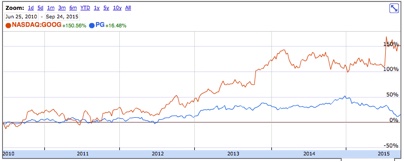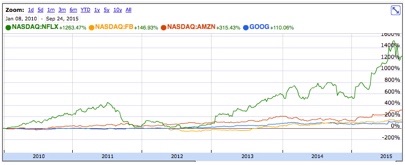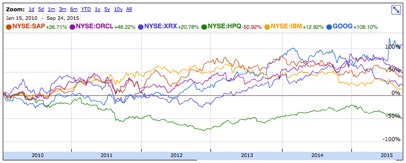|
Previously published October, 21 2015 Overview The adoption of technology moves in cycles and every decade or so, we look back and easily see what has had the biggest impact. It is more problematic to look forward and predict, with any reliability, the technologies which are on the edge of a revolution. However, it's not impossible. The first step is to understand the business environment you are in. This is critically important because, at the end of the day, it is technology that serves business, not the other way around. The second step is to look for technologies that can be combined into a self-reinforcing system which is highly adaptable and open. Business drivers The new economy business models In his seminal talk, Competition is for Losers - How to Start a Startup Lecture 5, Peter Thiel (founder of PayPal) [1] outlines a radical assessment of the current economic environment. "There are exactly two kinds of businesses in this world, there are businesses that are perfectly competitive and there are businesses that are monopolies. There is shockingly little that is in between. And this dichotomy is not understood very well because people are constantly lying about the nature of the businesses they are in. And in my mind this is not necessarily the most important thing in business, but I think it's the most important business idea that people don't understand." Google vs. the world Companies like Google are vastly more important to our day to day lives and command significantly more market capitalization than old economy enterprises like a commercial products company. It is helpful to look at the stock price as a proxy for the value of a company. One may argue that this is not the best indicator but if you consider the importance of shampoo and search in your life, you have to ask yourself what brands of shampoo does P&G even make? Answer: Prell and Head & Shoulders. This is precisely the point. Although P&G is a market leader, they still make a commodity product. There is almost nothing they could do to dramatically increase market share because in reality, they are in a perfectly competitive market. Perfectly competitive markets are driven by transparent pricing, well understood cost structures, multiple to unlimited competitors, and little product differentiation. Compare this to Google. The cost of search to most people is free and due to Googles' dominance, they don't even bother to set a price for AdWords but instead let the consumers fight for the highest price in an auction. When it comes to operating costs, their costs for a given service are obscured by their technology stack where they control every expense down to the proprietary server hardware. Competition is limited to very small niche players (e.g., DuckDuckGo). The crux of their monopoly, and why it is not only tolerated but applauded, is that Google has an infinitely differentiated product. Anyone and everyone can get the answer to any question they could ever ask. What about the other big players? These four companies typify the "New Enterprise" companies in the current economy. They are well known, innovative, respected, and well capitalized. They all have three important concepts at their core. First, they all set out to deliver a very personalized service. Google has search, Amazon has stuff, Netflix has TV, and Facebook friends. However, it's not just the quantity of choices at Amazon that is key, it's the personalization and ease of purchase that are key. The second critical point is that these companies didn't start out with a fully fleshed out solution. They took the idea of being customer focused and let it guide them to the solution. This is a dramatic shift from the mass market / industrial / business school model that has been driving the economy since the mass market revolution of the 1920's [2]. This drives home the third point, which is the role of small, obscure new technologies to have dramatic, far reaching impacts, and often unforeseen. The leveraging of these obscure technologies is driving the ascent of the New Enterprise companies. What about the other, older technology companies? The market has spoken and against the big enterprise consulting and software companies, Google's stock price is quite favorable. One thing to take note of on this graph is the performance of SAP and Oracle, two companies who are primarily software vendors versus the others who are consulting companies. One way to interpret this is that all of these companies are old established IT companies who are being forced to transition to new operating models and technologies that are changing faster than they can keep up. These new technologies tend to be architected in significantly different ways than the traditional enterprise software. The architectural differences are so dramatic, it would be nearly impossible to transition an application without completely scrapping it. Transitions like this are nearly unheard of and rarely successful because they are so disruptive and carry a substantial risk of failure. In the end, I'm afraid Peter Thiel is correct. You are either a monopoly (or at least an oligopoly) or you face perfect competition. It doesn't matter how big you are or how old. Whatever your industry, you only have one option. Create a monopoly by creating and delivering the best product possible to meet an unmet need. oligopoly |ˌäliˈgäpəlē| Fortunately, if you are paying close attention, you can learn from the monopolists and level the playing field, if only for a short time. Remember, in a perfectly competitive environment, early adoption of technology, even if it is perfectly applied and timed, only buys you a limited advantage. Failing to understand these little advantages can make it impossible to ever catch up. This applies to a company with one hundred thousand employees just as much as it does to a two founder start-up. Critical values Fortunately, if you are paying close attention, you can learn from the monopolists and level the playing field, if only for a short time. Remember, in a perfectly competitive environment, early adoption of technology, even if it is perfectly applied and timed, only buys you a limited advantage. Failing to understand these little advantages can make it impossible to ever catch up. This applies to a company with one hundred thousand employees just as much as it does to a two founder start-up. Critical values Coming to honest terms with living in a perfectly competitive environment leaves with one option: live by a set of business values that allow you to successfully adapt to the customers you have and the competitors you will have in the future. You could argue that these values are shared by every company, and it's true, but the success of technology driven start-ups [3] has shed new light focusing on a small set of core values. 1. Fiscal Responsibility A company must ruthlessly focus on financial stewardship at every stage. This means more than just managing cash flow and tracking burn rate. Creative people don't have just one good idea. Before you commit to one, you need to realistically assess its potential. Assessing the total available market size isn't enough. You should also pessimistically assess your specific target market and its potential to make money in a reasonable amount of time. A company must ruthlessly focus on financial stewardship at every stage. This means more than just managing cash flow and tracking burn rate. Creative people don't have just one good idea. Before you commit to one, you need to realistically assess its potential. Assessing the total available market size isn't enough. You should also pessimistically assess your specific target market and its potential to make money in a reasonable amount of time. (Conserve) money for things that matter, - Jeff Bezos [4] 2. Delivering value from day 1 Focusing on the things that provide customer value always pays off. The sooner you can deliver something of value to a customer, the sooner you will get useful feedback, and the more you receive, the better your product will be. 3. Ownership and commitment Everyone must be willing to take full responsibility for every aspect of the company, the product, and the customer relationship. This is particularly crucial for the early discovery of a viable business model. There will be significant failures and roadblocks and committing to serving customers rather than focusing on a specific solution is one way to soften the impact of an apparent failure. [1] Peter Thiel: Competition Is for Losers - WSJ
[2] See: A historical overview of the effects of new mass media: Introductions in magazine publishing during the twentieth century. for an interesting overview of the history of the magazine industry and the role competing technological innovations from the early 1900's. [3] Welcome To The Unicorn Club, 2015: Learning From Billion-Dollar Companies | TechCrunch Key quotes: The best times to start a unicorn company could be a) post the launch of a watershed new tech platform; and b) during a prolonged public market downturn. Without many great jobs available, the reduced opportunity cost and related hardship may spawn great innovation and grit. The companies in our set were generally not founded by inexperienced, high-school dropouts. The average age at founding was 34 years old (same as our last post). Audience-based company founders were 30 at founding; e-commerce founders were 32; SaaS founders were 35; CE/IoT founders were 36; and enterprise founders were 39. The overwhelming majority of companies (92%) start with a technical cofounder, and 90% have a founder with experience working in a tech company. It’s extremely rare for one of these companies to be started by someone who hasn’t worked in tech before. The few companies whose founders had no prior experience working in a tech are largely consumer-oriented companies, like Beats Electronics and Warby Parker. [4] Inside the Mind of Jeff Bezos | Fast Company (http://www.fastcompany.com/50106/inside-mind-jeff-bezos) Jeff Bezos' 2 Pizza Rule: Why Small Teams Work More Productively (https://blog.bufferapp.com/small-teams-why-startups-often-win-against-google-and-facebook-the-science-behind-why-smaller-teams-get-more-done)
2 Comments
9/26/2018 10:59:56 pm
These technologies are being on the top requirement as in we are living in the era of technology and evolution. It is all about the evolution that we have been making form the latest technology in hands.
Reply
Even though technology has the biggest role in the society nowadays, we must never forget the essence of workmanship. It is still better to know and continuously learn about work without the use of technology. We must comply with the requirements without having a shortcut. Commitment to work is very important. If you are not passionate about it, you will not stay in the company for so long because what matter is the passion and the attitude you have with your workmates.
Reply
Your comment will be posted after it is approved.
Leave a Reply. |
Brian McMillanSweating the details and still looking at the big picture. Archives
March 2022
Categories
All
|




 RSS Feed
RSS Feed